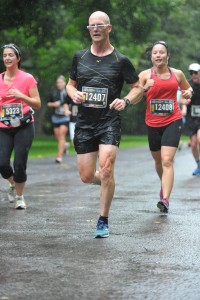Father’s Day Blog (pt 1 of 3): Like Fine Wine – Aging and the Male Athlete
Father’s Day Blog: Like Fine Wine – Aging and the Male Athlete – Part 1 of 3:
by Derek Salley
“Having arrived at the half way point (age 50) I need to train to drink really yummy Single Malt Scotch…”
Wait that didn’t come out right. Ok, I’ll get to the connection on that later, but while aging places a great many challenges before the recreational and masters athlete, it comes with a host of benefits and rewards as well. Rest, recovery, nutrition and training itself are all affected in ways most of us don’t realize or at least don’t fully acknowledge.
The challenges (not an exhaustive list):
- For many, as we age our Resting Metabolic Rate (RMR) declines, meaning that we may not need as much fuel per day to satisfy our caloric needs;
- We have increased need for certain vitamins and minerals;
- The body needs more time to repair itself after exercise;
- Bone mass and density may decline, and muscle atrophy is common;
- Flexibility may be reduced;
- Last but not least, find me an athlete over 40 who is in perfect health and who has not been injured in any way, and I’ll show you a fibber. Life has a tendency to beat us up. Whether it’s just a matter of repetitive use syndrome/tendonitis from your desktop mouse, a bad back from sitting at that desk all day, or something more serious either from work or play, the accumulation of once acute injuries and chronic conditions takes a toll on most of us.
Mmm, food… and drink!
Life isn’t fair. We already knew that but how cruel is this: RMR may experience decline, and we need more vitamins and minerals. These two are clearly at odds. As we get older, unless we keep active, our daily caloric needs tend towards falling, but not the need for nutrients. “How can I possibly get all those vitamins and minerals I need when I need to eat less than I used to?” This means a few things. Do more “stuff” – physical activity to raise the demand your body has for fuel per day. Maintaining higher activity levels and training appropriately are a great start. This will keep the metabolism on “cook” mode. Next, there is less nutritional forgiveness as we get older. Recall the days when you could eat Big Macs ™, fries and shakes with impunity…those days are over. Notice instead how each year it seems just a bit tougher to maintain the weight you prefer, and your body is less happy when you stray from eating well. More of what we eat, percentage wise, has to count positively. Not just what, but when as well. Here are some tips from a variety of sources, pertaining to fuelling the body as we get older:
- Ditch the low carb fads – research confirms the need for a higher percentage of carbohydrate to properly fuel our tissues for performance and wellness as we get older- 2/3 of our plate from carbohydrate sources is a good rule of thumb (K.J. Brown, MS, RD, Sports Nutritionist). Note that carbs are not just potatoes, bread, rice and other starches! Fruits and vegetables are carbs! Why this notion has got twisted around in the recent past leaves me exasperated. Remain committed to a balanced diet consisting of quality lean proteins and fat from good sources as well. Our understanding of what makes a good fat, protein or carb is continually evolving. So that’s the capture on macro-nutrients. My own spin on this is stay up to date with the latest information, everything in moderation, and portion control, portion control, portion control
- Eat a strong protein and carbohydrate mix including anti-oxidants shortly after workouts/ strenuous activities, says the godfather of triathlon coaching, Joe Friel, along with every strength training coach for the past 25+ years. “Shortly” – I’ve read anywhere from 20-45 minutes. Call it a half hour and you’re good. My own preference (and it seems to be working), for more than 20 years now, is a shake with OJ, bright (anti-oxident rich) berries – strawberries, blueberries, raspberries, etc, banana, mango, and a scoop of good quality vanilla whey protein. Friel also makes note of the alkaline benefit of fruits and vegetables for restoration of blood pH levels, which in turn provides nutritional support to bone and muscle mass maintenance.
 You may need vitamin and mineral supplementation. Inasmuch as you shouldn’t bring out a table top tray that amounts to most of what Costco or the local pharmacy has on the shelves (and I’ve seen lots of folks older than me do this at every meal!), you may need a bit extra in a few choice areas. Iron and calcium, for sure (yes, us men too!), and in addition according Brown, Vitamin A, vitamin D, vitamin E, vitamin C, vitamin B6, folate, thiamin, riboflavin, niacin, and vitamin B12 have often been found to be deficient in older adults. A study by Campbell and Geik affirm the potential need for vitamins B2 (Riboflavin) B(6), B(12), D, E, and folate supplementation. Finally from an article by M. Fitzgerald, competitor.com, “A diet that is laden with antioxidant-rich fruits and vegetables will slow the aging process and its effects on performance. This is true because aging is caused in part by free radical damage to body tissues. As the body ages its antioxidant capacity—that is, its capacity to protect itself from free radicals—decreases, and antioxidant capacity, in turn, is linked to endurance performance. Supplementing a plant-based diet with additional antioxidants may yield further benefits. A study conducted by researchers at UCLA and published in the Journal of the International Society of Sports Nutrition provided intriguing evidence that antioxidant supplementation may be especially helpful to older endurance athletes.” Three caveats: there continues to be debate as to the efficacy of supplementation; the key word is “supplementation – don’t eat pills instead of good food, eat good food and employ supplements as part of your strategy; and finally, it is always best to consult a certified nutrition specialist to address your own specific dietary needs.
You may need vitamin and mineral supplementation. Inasmuch as you shouldn’t bring out a table top tray that amounts to most of what Costco or the local pharmacy has on the shelves (and I’ve seen lots of folks older than me do this at every meal!), you may need a bit extra in a few choice areas. Iron and calcium, for sure (yes, us men too!), and in addition according Brown, Vitamin A, vitamin D, vitamin E, vitamin C, vitamin B6, folate, thiamin, riboflavin, niacin, and vitamin B12 have often been found to be deficient in older adults. A study by Campbell and Geik affirm the potential need for vitamins B2 (Riboflavin) B(6), B(12), D, E, and folate supplementation. Finally from an article by M. Fitzgerald, competitor.com, “A diet that is laden with antioxidant-rich fruits and vegetables will slow the aging process and its effects on performance. This is true because aging is caused in part by free radical damage to body tissues. As the body ages its antioxidant capacity—that is, its capacity to protect itself from free radicals—decreases, and antioxidant capacity, in turn, is linked to endurance performance. Supplementing a plant-based diet with additional antioxidants may yield further benefits. A study conducted by researchers at UCLA and published in the Journal of the International Society of Sports Nutrition provided intriguing evidence that antioxidant supplementation may be especially helpful to older endurance athletes.” Three caveats: there continues to be debate as to the efficacy of supplementation; the key word is “supplementation – don’t eat pills instead of good food, eat good food and employ supplements as part of your strategy; and finally, it is always best to consult a certified nutrition specialist to address your own specific dietary needs.- Washing it down. North America is chronically dehydrated. Few of us consume sufficient fluids in our day. And yet it’s an easy fix. We live on a continent with no shortage of fresh water. I’ve heard all sorts of answers to how much water we should drink in a day. The one I like best (hard for me to admit but Dr. Oz said it) – pee clear. Or at least almost clear anyway. For anyone taking “bright supplements” – things like Vitamin B and C supplements for example, neon pee will be standard first thing after taking these, so my rule of thumb is pee almost clear, a few hours after taking your vitamins. Fuel and hydrate your workouts. Good rule of thumb (according to Chris Carmichael, Carmichael Training Systems) is that most of us can go with water for activities/workouts of less than hour, and for workouts greater than that, add an carb/electrolyte in solution, readily available from nutrition, cycling, running, and training stores locally or online.
 5. Tracking tools such as My Fitness Pal www.myfitnesspal.com are a great weapon for your personal nutritional assault. Databasing for the aforementioned is excellent for Canada. Naysayers will tell you that the numbers are wrong on such tools. GIGO – Garbage In Garbage Out. Accuracy and honesty with yourself are paramount. Regardless of the numbers, three ideas prevail: trends are still present and easily observable, you the user will increase your awareness of your fuelling and hydration, and finally, it will change the way you behave. I’ve done it myself- “hmm, maybe I don’t need that extra beer tonight?” I’ve muttered to myself as I looked at the app and saw where I was at for the day on fuel intake. And it and I were right. It wasn’t killjoy, I’d already enjoyed a nice relaxing evening and a beer and that second one got to stay in the fridge for another day and we were both better for it.
5. Tracking tools such as My Fitness Pal www.myfitnesspal.com are a great weapon for your personal nutritional assault. Databasing for the aforementioned is excellent for Canada. Naysayers will tell you that the numbers are wrong on such tools. GIGO – Garbage In Garbage Out. Accuracy and honesty with yourself are paramount. Regardless of the numbers, three ideas prevail: trends are still present and easily observable, you the user will increase your awareness of your fuelling and hydration, and finally, it will change the way you behave. I’ve done it myself- “hmm, maybe I don’t need that extra beer tonight?” I’ve muttered to myself as I looked at the app and saw where I was at for the day on fuel intake. And it and I were right. It wasn’t killjoy, I’d already enjoyed a nice relaxing evening and a beer and that second one got to stay in the fridge for another day and we were both better for it.- My own spin on nutrition? Repeat after me… “There is no magic pill”, “there is no magic revolutionary diet”. Am I shooting myself in the foot on my first days? I don’t think so. Here is the magic. If there is a magic something, it’s not a thing, it’s a “someone.” A cheerleader, a shoulder to lean on. Whether it’s a coach, a trainer, an expert in the field, or even a loved one. Did I mention portion control? Eat a little, eat often, eat as close to source as is practical throughout your day, own what you eat, be attentive to what goes in everyday. Find what works for you. Drink a glass of water before eating? Sure. 3 meals and 3 snacks? Sure. Big meal at lunch hour? Sure. Your solution needs to work for you and you alone. Along with the notion of eating closer to source, from the Dietary Guidelines for the Brazilian Population 2014 (Portuguese: Guia alimentar para a população brasileira 2014), eat socially:
“Eat slowly and enjoy what you are eating, without engaging in another activity. Eat in clean, comfortable and quiet places, where there is no pressure to consume unlimited amounts of food. Whenever possible, eat in company, with family, friends, or colleagues: this increases the enjoyment of food and encourages eating regularly, attentively, and in appropriate environments. Share household activities that precede or succeed the consumption of meals.”
Doesn’t that sound great? Way better than scarfing a processed granola bar between meetings!
-Coach Derek
Next up in Part 2: Training for sustainable, balanced fitness as we age.
Part 1 additional reading:
——————————
Recommended Posts
Showing 2 comments






Supplements are beneficial, I take a few mylesf. However, you really should discuss with your doctor what you should be taking, rather than just taking everything under the sun. There is such a thing as too much of something good. My naturopath did blood tests and discussed my diet with me, and made recommendations on what I take based on my individual needs. For example, even though Im a vegetarian, my iron levels are well within the healthy range. I don’t need an iron supplement, even though many vegetarians do. There was no way to know that without the tests only a doctor can order. On the flip side, I needed more calcium and vitamin d. He told me to take a supplement, drink more milk (I’m ova-lacto, not vegan) and to spend 20 minutes a day in the sun. Again, I never would have known if my doctor didn’t test. Talk to a doctor before taking anything, as you don’t want to overdose on one thing and still be deficient in another.
I agree Katja. Always check with a health professional first. I will add this disclaimer to the blog. Thanks for pointing it out